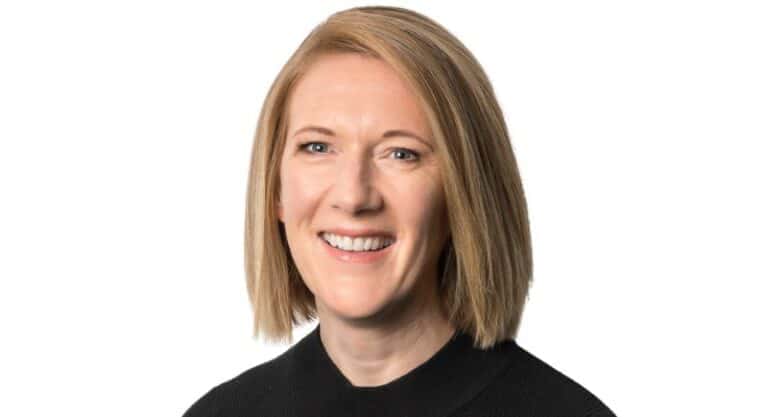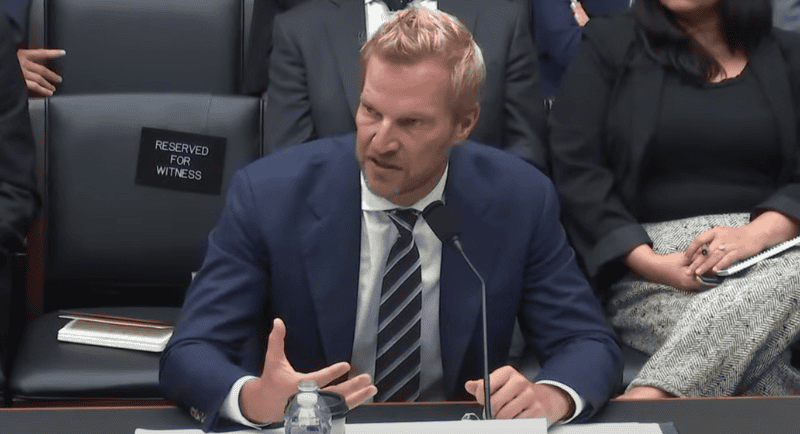Two of the news industry’s biggest advocates – Schwartz Media CEO Ben Shepherd and ThinkNewsBrands’ CEO Vanessa Lyons – have hammered outgoing GroupM CEO Christian Juhl‘s claims that “brands prefer to avoid advertising” next to the news.
Appearing in Washington for the House Judiciary Committee hearing on Collusion in the Global Alliance for Responsible Media earlier this month, Juhl said: “Today, trust in news sites is at a low point, and brands generally disfavour advertising next to news. For example, only 1.28% of brand spend is allocated to online news at this point.
“This is because brands prefer to avoid advertising alongside common news content, war, scandal, political division, and also because they do not need to advertise there to reach their target audience. Alternatives such as sports and entertainment provide a better way to reach these same consumers.”
Shepherd spent 15 years working for agencies, before taking the major publisher-side role earlier this year. He said in his time at agencies like CHEP, Thinkerbell, and Dentsu, “I never heard a client say they wanted to avoid the news.”
Shepherd told Mediaweek that he has had discussions with brands over concerns about appearing near inflammatory opinion pieces, and recommended avoiding specific verticals if there was discomfort. But he never encountered a client who wanted to completely avoid the news.
“And I never have had a client categorise news as Juhl did as ‘war, political division and scandal’,” Shepherd added.
“This is a categorical misrepresentation that is stunning from the leader of a media agency in control of over USD$60 billion of investment globally.”

Ben Shepherd
Lyons, CEO of ThinkNewsBrands, agreed with Shepherd that news is engaging and effective, and questioned the accuracy of Juhl’s comments.
“The thinking around ‘brand suitability’ which has seen some brands and their agencies avoiding news has gotten completely out of hand and isn’t based on facts,” Lyons told Mediaweek.
“Recent research by Stagwell and HarrisX found that placing ads next to news stories about conflict, inflation or crime had no discernible difference on brand perception compared to ads placed next to sport or entertainment.
“This misconception is leading brands to miss out on an extremely effective media environment where consumers are actively seeking information rather than just vacantly scrolling.
“The real facts tell the story.”

Vanessa Lyons
Shepherd concurred: “What we have here is a global media group CEO asserting that the entire media agency world is removing itself from news based off an incorrect assertion.” He acknowledged that “the news industry can shoot itself in the foot when it engages in tactics that are way out of step with the values of broader society,” such as “funding the defamation defence of an alleged war criminal (and losing)”.
“But they do not represent the work that 99.9% of news organisations and journalists do every single day, and the value that audiences place on this content,” he said.
GroupM declined to comment on Shepherd’s argument.
At the hearing, Juhl was grilled by Ben Shapiro, a right-wing commentator and co-founder of conservative news site The Daily Wire. Shapiro said the Global Alliance for Responsible Media (GARM) – which creates advertiser guidelines with brand safety in mind – is a “cartel”.
Juhl said that amidst social and political division, advertisers “have placed a growing emphasis on brand suitability and accountability.”
“One of marketers’ biggest fears is that years, sometimes even generations, of reputation could evaporate overnight as a consequence of bad ad placement.”
He noted that sports and entertainment content was an alternative, and better, less risky, way to reach the same consumers who read other types of news.
Shepherd told Mediaweek said there is no credible delineation between the verticals – hard news and sport and entertainment news all serve to engage audiences.
“Some brands have an affinity towards sport as they want to be associated with performance and/or high passion, but ultimately at the end of the day all these forms of content are just that, content.”
In his industry newsletter, Signal, Shepherd calculated that based on Juhl’s assertion that only 1.28% of spend went to news content, GroupM would have spent $751 million in online news environments in 2023, as part of its USD$62.2 billion in total media investment. In Australia, he predicted the amount would be $22 million of GroupM’s total investment.
“Based on the CEO’s testimony that only 5% went into news environments overall, this would mean a little over $3 billion globally reaches news adjacent placements.
“This is staggering considering the audience volume for news online, for news on TV, for news in podcasts and audio, and news content on online video. News is a primary driver of engagement for all of these mediums. In every market in the world.”
While Juhl highlighted global ad spend on news content was 1.28%, GroupM has made efforts to support responsible journalism and credible local Australian news publishers with its Back to News initiative, launched last year.
‘Brands should be investing more in news, not less’
Lyons highlighted research by FiftyFive5 that showed engagement increased 2.3 times more in news environments than the average of other media channels. The same research showed advertising in news is 18% more trustworthy relative to all other media.
She also pointed to Peter Field’s IPA DataBank that demonstrated that brands advertising on news platforms from 2018-2022 had an 88% higher profit growth.
“Brands should be investing more in news, not less,” she said.
“The strategic reallocation of media spend into Total News, even by an additional 6%, can significantly enhance both upper and lower funnel metrics.
“ThinkNewsBrands is compiling a report to be released in the coming weeks, in which we will collate some of the leading research on this topic that will put these sorts of myths to bed. We look forward to sharing it with the industry and its clients.”
‘It’s a stunning gap between the actions of consumers and the actions of an agency’
Shepherd pointed to Meta, the parent company of Facebook and Instagram, as “one of the least trusted brands in Australia.”
He told Mediaweek: “It receives $5 billion from advertisers and a huge chunk of this is from agencies like GroupM.
“But trust is used by the GroupM CEO as an explanation as to why, despite almost 50% of the world’s population being news consumers, and the majority via digital means, only 1.28% of GroupM spend goes to digital news environments.
“It’s a stunning gap between the actions of consumers and the actions of an agency seeking to make their clients’ brands appealing to these consumers.”
Earlier this month, GroupM announced Brian Lesser will become global CEO in September when Juhl moves into the position of president, corporate development at WPP. Juhl has spent five years as GroupM boss.
–
Top image: Juhl
